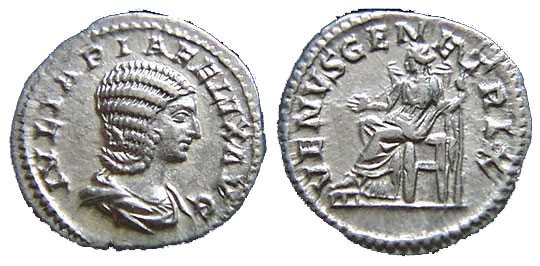| 193 AD - 217
AD |
Roma Imperium Romanum Iulia Domna
Ρώμη Ρωμαϊκή Αυτοκρατωρία Ιουλία Δόμνα
| Denarius AR 18 |
SHH 1689 |
 |
| Parameter Obverse Reverse Notes Reference Acquired |
2.80 g 17.9-18.1 mm 6:00
o'clock EF Draped bust of Iulia Domna right with elaborately curved combed hair; IVLIA PIA FELIX AVG; border of dots. Venus seated left with foot-stool, extending right hand and holding scepter in left; VENUS GENETRIX; border of dots. Mint of Rome under Caracalla Cohen 212; Roman Imperia Coinage (RIC) 388b; Sear Roman Coins 7107 22.6.2002 |
|
Julia Domna (170-217 AD)
The
daughter of Iulius Bassianus, priest of Elagabulus and Baal, Julia
Domna was born in Syria in 170 AD. She became the wife of a future
emperor almost by accident, when a fortune teller told her that she
would one day marry a king. Rumour
of this reached the widowed senator Septimus Severus and, as the Romans
were deeply superstitious, he sought her for his future wife. At the
age of 16, she married the future emperor in 186 AD. She soon became a
firm favourite with Severus, as she had everything a future emperor
could want in a wife - looks, charm, wit, intelligence - and a cunning
that would befit any member of the Roman political arena. She
was not just a figure beside Severus, she was also a empress who helped
her husband administer the empire. When he was away on business, she
virtually ran the whole show with her sister, Julia Maesa. Always ready
to take in more knowledge, she became adept at passing laws, handling
political intrigue, dealing with those who plotted against the throne,
and also handling personal matters with ease. It has been recorded that
she was cruel, manipulative, had many extra marital affairs
For some reason their marriage a childless until 188 AD when their first son, M. Aurelius Antoninus (also known as Caracalla) was born. P. Septimius Geta followed in 189 AD. After the brief civil war, Severus ascended to the throne in 193 AD. In recognition of Julia Domna's years of devoted service, she was awarded the title of 'Augusta'. But not everyone was taken by the charisma of her character. The Praetorian Prefect C. Fulvius Plautianus had wide ranging powers bestowed on him by the emperor, maybe to ensure his wife would not dethrone the emperor while he was absent from Rome. In what could be seen as a political move, Plautianus had his daughter marry Caracalla, thus ensuring he would always have direct contact with the emperors wife and so work to bring about an uprising against her. In 208 AD, Severus came to Britain as head of the military to quell insurrection in northern Britain, and brought his family with him. He was a firm ruler but also corrupt and cruel. This streak of viciousness had been passed to his sons even before the fateful trip to England, Caracalla had plotted to kill both his father and brother on many occasions. In 211AD Severus died at Eburacum (York). His final instruction to his sons was 'Rule together as brothers, enrich the soldiers, and forget about everybody else'. This went unheeded and it was a year late after returning to Rome that Caracalla - who was now co-ruler of the empire with his brother - arranged the murder of Geta. |